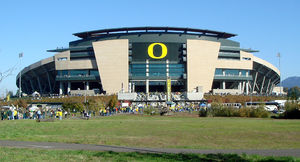The College football Portal
College football (French: football universitaire) is gridiron football that is played by teams of amateur student-athletes at universities and colleges. It was through collegiate competition that gridiron football first gained popularity in the United States.
Like gridiron football generally, college football is most popular in the United States and Canada. While no single governing body exists for college football in the United States, most schools, especially those at the highest levels of play, are members of the NCAA. In Canada, collegiate football competition is governed by U Sports for universities. The Canadian Collegiate Athletic Association (for colleges) governs soccer and other sports but not gridiron football. Other countries, such as Mexico, Japan and South Korea, also host college football leagues with modest levels of support.
Unlike most other major sports in North America, no official minor league farm organizations exist for American football or Canadian football. Therefore, college football is generally considered to be the second tier of American and Canadian football; ahead of high school competition, but below professional competition. In some parts of the United States, especially the South and Midwest, college football is more popular than professional football. For much of the 20th century, college football was generally considered to be more prestigious than professional football.
As the second highest tier of gridiron football competition in the United States, many college football players later play professionally in the NFL or other leagues. The NFL draft each spring sees 224 players selected and offered a contract to play in the league, with the vast majority coming from the NCAA. Other professional leagues, such as the CFL and UFL, additionally hold their own drafts each year which see many college players selected. Players who are not selected can still attempt to obtain a professional roster spot as an undrafted free agent. Despite these opportunities, only around 1.6% of NCAA college football players end up playing professionally in the NFL. (Full article...)
Selected article
After the opening game of the 2009 season, Blount was suspended again, this time for the remainder of the 2009 season. Kelly issued this suspension after Blount punched an opponent and angrily confronted fans immediately after the nationally televised season-opening loss.
Quotes
- We need a playoff. — Bernie Machen, president of the University of Florida who supported creating a play-off for NCAA Division I-A
- I like to believe that my best hits border on felonious assault. — former Ohio State Buckeyes defensive back Jack Tatum, on the fierce quality of his play
- If anything goes bad, I did it. If anything goes semi-good, we did it. If anything goes really good, then you did it. That's all it takes to get people to win football games for you. — University of Alabama Crimson Tide head coach Paul "Bear" Bryant, on his motivational techniques
- When people used to see Wake Forest on the schedule, they used a pen to mark down a `W.' We're at the point now where we at least make them use a pencil. — Wake Forest head coach Jim Grobe
Did you know...
- ... that the Harvard Crimson football team (home stadium pictured) has won 12 national championships and is the eighth winningest team in NCAA Division I football history?
- ... that American football running back Keith Elias graduated from Princeton University with 21 Princeton Tigers records and 4 National Collegiate Athletic Association I-AA records?
- ... that Vanderbilt's "Blonde Bear" supervised the ransacking of black households in the 1946 Columbia Race Riot?
- ... that Native American football player Peter Hauser has been credited with throwing the first spiral pass?
- ... that the Yale Bulldogs football team (mascot pictured) has won 27 national championships and ranks second in wins in college football history?
- ... that Michigan's All-American 60-minute man Tom Johnson was the second African-American player for the Green Bay Packers?
- ... that Deputy National Security Advisor Denis McDonough played for Hall of Fame football coach John Gagliardi at Saint John's University?
- ... that the Wittenberg Tigers from Springfield, Ohio, have won more games than any other Division III college football team?
Selected image
 |
Autzen Stadium, home of the Oregon Ducks football team.
Calendar
| Dec 9 | Army–Navy Game | Army vs Navy |
| Dec 29 | Cotton Bowl Classic | #7 Ohio State vs #9 Missouri |
| Dec 30 | Peach Bowl | #10 Penn State vs #11 Ole Miss |
| Orange Bowl | #5 Florida State vs #6 Georgia | |
| Jan 1 | Fiesta Bowl | #8 Oregon vs #23 Liberty |
| Rose Bowl | #1 Michigan vs #4 Alabama | |
| Sugar Bowl | #2 Washington vs #3 Texas | |
| Jan 8 | College Football National Championship | #1 Michigan vs #2 Washington |
| 2023 season: FBS (Bowl games) • FCS • D-II • D-III | ||
|---|---|---|
WikiProjects
Subcategories
College football topics
Sports portals
Associated Wikimedia
The following Wikimedia Foundation sister projects provide more on this subject:
-
Commons
Free media repository -
Wikibooks
Free textbooks and manuals -
Wikidata
Free knowledge base -
Wikinews
Free-content news -
Wikiquote
Collection of quotations -
Wikisource
Free-content library -
Wikiversity
Free learning tools -
Wiktionary
Dictionary and thesaurus











